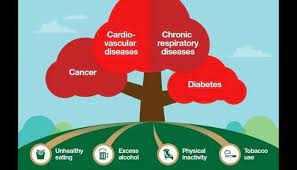Non-communicable diseases (NCDs) are chronic conditions that are not passed from person to person. These diseases are often caused by a combination of genetic, environmental, and lifestyle factors. Some common examples of NCDs include heart disease, cancer, diabetes, and chronic respiratory diseases.
The effects of NCDs can be devastating, both on an individual and societal level. These diseases are the leading cause of death worldwide, accounting for 71% of all deaths globally. NCDs can also have a significant impact on a person’s quality of life, leading to disability, pain, and suffering.
In addition to the human toll, NCDs also place a heavy burden on healthcare systems and economies. The cost of treating and managing NCDs is high, and can strain healthcare resources. In some cases, NCDs can also lead to lost productivity and decreased economic growth.
Preventing and managing NCDs requires a multi-faceted approach that includes promoting healthy lifestyles, early detection and treatment, and improving access to healthcare services. By addressing the risk factors for NCDs, such as smoking, poor diet, and lack of physical activity, we can reduce the burden of these diseases and improve the health and well-being of individuals and communities.

